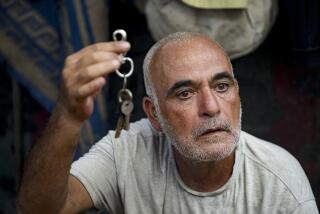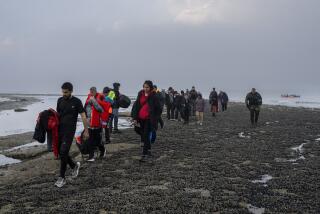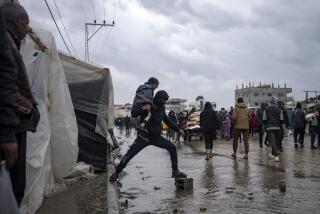For Refugee Multitude, Death Is Ever Present : Kurds: Many are children, and they are weakening daily. Medical aid is only beginning.
BORDER POST 49, Iraq — In the anguish and misery of the new refugee life in the mountains on the Iraq-Turkey border, the nights are the worst.
As dusk falls, a mist of blue-gray smoke rises from thousands of campfires as nearly 300,000 refugees from Saddam Hussein’s Iraq huddle for warmth.
For more than a week, this multitude has slept rough, rolled in blankets, coats or sacking. Only a lucky few have tents, and improvised shelters of branches and plastic sheeting slowly flash reflections of the sun’s dying rays as it dips behind the great peaks of Kurdistan.
The nights are cold, very cold. Some refugees have even been stranded on freezing fields of snow, many with nothing but the clothes they had on when they fled the onslaught of Hussein’s forces.
Medical aid is only beginning. The refugees warm the children in the front rows around night campfires, which carpet the mountainside with pinpricks of light. The holding areas fill with voices of people searching for lost relatives, stumbling over the stones and ankle-deep mud.
Most of the deaths are at night. Turkey says that 1,500 of the refugees on its border have died of wounds, hunger, cold and exhaustion. Many of the dead are children.
But, apart from the privileged Turkish-speaking Turkoman minority of northern Iraq, Turkey is not letting anyone except hospital cases out of the holding areas. There is nowhere to go. Each morning starts again with the search for food and firewood, a dangerous pursuit along the mine-strewn frontier. Mine blasts have killed several refugees.
It was usually days before even food was delivered to the refugees, time lost before the extent of the exodus was finally realized and as soldiers barred access by anyone to the area. But finally local Turkish Kurds were allowed to act, helping well before the arrival of international or even most Turkish aid.
At the base of one mountain, one group of such volunteers sat feverishly opening cans and preparing family sized sacks of food on a bank of the raging, silt-laden Great Zab River, a tributary of the Tigris that links the Kurdish areas of Turkey with those of Iraq to the south.
“People are dying up there. We have to help,” said Yusuf Darran, a 20-year-old day-laborer from the local provincial capital of Hakkari, three hours away from here by a rough road. A volunteer, he said he had already been working 24 hours.
Many of the volunteers were also fasting for the Muslim month of Ramadan, a custom that means nothing may pass the lips between dawn and sunset. But one emotional middle-aged Turkish Kurd named Rami said his Ramadan had gone by the board--but not his will to help.
“I took 50 kilos (110 pounds) yesterday, but it was too much and I can’t take more than this,” he said, holding up two plastic bags with two loaves of bread in each.
Faced with such kindness, the refugees are quiet in any criticism. As was the case in northern Iraq before the exodus, the population includes not just Kurds but significant minorities of Turkomans, Assyrian Christians, Arabs and Jews.
But most are Kurds. The local Turkish Kurds protest the decision by Ankara to keep the refugees out, saying that almost all of those arriving have family links and that border camps are exposed to the danger of Iraqi attack.
“It’s just not safe. We should have them in our land,” said Naim Geylani, a Kurdish clan lord and parliamentary deputy from Hakkari.
Minibus driver Mustafa Said was more succinct. “I found 60 people from my clan. We should be looking after them in our homes. . . . It is their turn to suffer today, but it may be ours tomorrow.”
More to Read
Sign up for Essential California
The most important California stories and recommendations in your inbox every morning.
You may occasionally receive promotional content from the Los Angeles Times.










